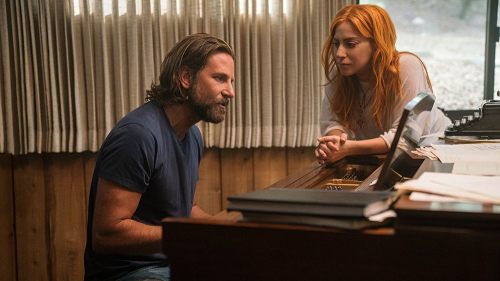A STAR IS BORN Review: The Same Twelve Notes, Played Pretty Damn Well
There's a notion contained in the realm of pop music that every song you hear – be it by The Beach Boys, The Beatles or The Beasties – is really nothing more than the same twelve notes, retooled into a new, catchy hook. Hell, Brian De Palma made an entire rock opera based around this idea with Phantom of the Paradise ('74), which saw a pint-sized music producer (Paul Williams, who also penned the picture’s infectious OST) spinning the same ditty into greaser rock, surf pop, glam metal and diva posturing, all while a wronged artist (the great Bill Finley) attempts to reclaim the work this little megalomaniac swiped from him.
Near the end of Bradley Cooper's A Star Is Born – the marquee idol's muscular, big budgeted, musical debut behind the camera – surly manager Bobby (Sam Elliott) verbalizes these sentiments to newly minted icon Ally (Lady Gaga), seemingly summing up Cooper's entire motivation for making the damn movie. Cooper's take on this timeless silver screen mold – the fifth iteration of A Star Is Born following What Price Hollywood? ('32), the Fredric March-fronted the '37 film (and first to sport the name), Judy Garland's '54 turn behind the mic, and Barbara Streisand’s '76 vanity project – is a throwback to the character-driven adult melodramas of New Hollywood. So, it makes perfect sense that Kris Kristofferson's craggy, boozy John Norman Howard (from Star '76) seems to be the template for Cooper’s own fictional bluesy rock legend, Jackson Mane.
From the opening moments, when we're on stage with Mane as he rocks out before collapsing into the back of a limo piloted by his trusty driver (Greg Grunberg) and downs a whole bottle of vodka, we know exactly what era this guy sees himself in. The problem is, the rest of the world's moved on. Even the lyrics from Jackson's songs seem to bluntly convey his inner turmoil. "Maybe it's time to let the old ways die?" he sings, yet fans are still showing up in droves to his arena-sized shows. Nevertheless, something just doesn't quite feel the same. His gloriously chic cabin home is laced with vinyl from the classic rock days - a wood paneled cave he can pass out in while presumably dreaming of the bold, meat and potatoes songwriters of the past.
In short, Jackson's totally burned – not quite ready to hang it up, though certainly cognizant of the fact that his moment is passing – and his lack of enthusiasm shows when Bobby watches him play. Somewhere along the way, music stopped being a passion and simply became his job. However, retirement isn't really an option, because deep down Jackson knows it'll just lead to a quick death at the bottom of a bottle. Cooper chooses to portray his Star’s central icon as a man fully aware of his flaws, even as his vice begins to creep in and take hold in ways he always thought he could prevent via sheer macho will.
Enter Ally (née Stefani Joanne Angelina Germanotta): a server at a swanky restaurant who can belt out Édith Piaf so well that the queens at her favorite gay bar don't mind letting the waitress take the stage on drag night every Friday. Ally's shy, and sweet, and lives with her limo driver dad (Andrew Dice Clay), who's always thought his girl could be famous, but knew her homely looks would end up holding her back. It's a sentiment that Ally's bought into her whole life, and explains to Jackson (naturally over a drink he buys the singer after her show) that every single record producer or manager she's ever encountered has always told her she's not pretty enough to make it. Her nose is too big, and her looks too plain, so she just kind of gave up after a while.
The most unbelievable part of Cooper's Star is Lady Gaga playing an artist who's terrified of letting the world see her shine – or who requires a man gift her the confidence to do so (a narrative point that's surely going to stick in some viewers' sides) – but that's what renders Germanotta's performance so utterly remarkable. She totally fleshes Ally into a three-dimensional human being, punching a cop in an afterhours bar because she suddenly becomes protective over her new friend being approached by strangers, and then soloing one of her singles in a grocery store parking lot for Mane while she ices her swollen hand with a bag of frozen peas. Like all Gaga's art, it's a fearlessly naked performance, allowing the audience to peer into Ally's soul and see the scared dreamer who resides at her core. You've probably heard a bunch of Oscar buzz thus far, but Gaga's honestly even better than promised: her performance a bold announcement that she's an actress to be reckoned with, as well as one of our premier pop stars.
A great musical is a lot like a great action movie, in that it's all about watching the performer operate within the frame. Much how we love to see Jackie Chan engage in stunts without the aid of cutting to make us think he just pulled off the impossible, it's thrilling to watch directors showcase musicians via clean coverage that highlights what each song (and how they sing it) means to them. Cooper seems to understand this storytelling concept quite well, working with legendary cinematographer Matthew Libatique, he lets us see Ally's reactions to every step of her journey toward superstardom. From her "holy shit, I'm actually doing this" first performance of the movie's theme (the already meme'd into oblivion "Shallow") to the final heartbreaking ode to her tragically flawed muse, Cooper and Gaga work together to deliver these show-stopping numbers that are just as much about developing Ally's character as they are about letting her vocally wow us.
The legend goes: writer/director William Wellman and co-screenwriter Robert Carson based Star '37 on the troubled relationship between Barbara Stanwyck and Ted Healy, whose descent into full-blown alcoholism led to him beating the starlet as her stock soared and his plummeted. In a sense, the man was always supposed to be the villain of the story, his lust for booze only accenting his growing jealousy of the talent he plucked from obscurity. Screenwriters Eric Roth and Will Fetters (along with Cooper) thankfully aren't into such black and white moralism, and instead paint Jackson and Ally's love as just that: an undying flame that could've stood the test of time, had the bluesy rebel not let his disease get the best of him.
"Disease" is the key word here, as A Star Is Born's wonkier aspects deal with Mane attempting to kick his addiction. As it does with many, the bottle brings out the worst in Jackson, but Ally's still the only person who's able to sooth that savage beasts because she understands just how broken he is (a fight involving a donut veers from uncomfortable abuse to illustrating just how much power she holds over him). Instead, the heel of Cooper’s Star becomes Brit manager Rez (Rafi Gavron), who's essentially supposed to evoke American Idol doofus, Simon Cowell. Promising to take Ally to the top after her appearances on stage make her a YouTube sensation, his vision for the songwriter (like all the agents from her past) is one of pure image: a Taylor Swiftian-ascent from earthy ballad crooner to plastic pink-haired pinup.
Rez's presence highlights one of Star's recurring (yet somewhat underdeveloped) themes: controlling men. As much as we want to cheer on Mane as he urges Ally forward with tried and true platitudes like "you need to tell the world what you want to say while they're willing to listen", it's also difficult to shake how his interactions with the woman (including pulling her out on stage to sing) are nothing short of intrusive. Sure, he helps her discover and channel that inner songwriter she's been stashing away, but he also seems to get frustrated when she shies away from anything he deems "authentic". Same goes for Rez, who takes Ally’s truth and then sprinkles it with candy-coated dust, scolding the singer every time she deviates from his plan (such as sending dancers away when she feels like performing solo).
When combined with Jackson's strangely under-formed POV (as we sense his conflict with Ally's newfound career, but it's never explicitly stated), this leads to a somewhat saggy second act, where we keep waiting for the conflict to arrive. Plus, Ally is a very active character, filled with strength and agency...until she isn't. Ally tells Jackson that she won’t stand by him when he drinks, yet still does (and even endures a rather uncomfortable scene where Jackson calls her "ugly"). It's not until the very last moment that Ally's tarnished soul and stardom are fully fused, but by this point, it's because she basically gave up her will to fight against the drunken animal she adores. Sure, there's relatability to her character's "love above all" sense of devotion, but it also renders her not so much conflicted, but confusingly written.
Regardless, Cooper overcomes these slight pacing and character issues by proving himself (perhaps predictably) a pretty outstanding director of actors. As phenomenal as both he and Gaga are, Sam Elliot subtly sweeps the movie out from under them at times as Bobby, a brokenhearted brother whose let Jackson's wildest days take a toll on him as well. Elliot's been one of our finest actors for a long while – the walking/talking personification of true grit – but here he's wounded and vulnerable during certain moments that are going to surprise folks who only really know him as the steel-jawed cowboy from Tombstone (’93). At the end of a conflict with Jackson near the movie's middle, there's a flash of full-body acting that's just astonishing, as Elliot conveys years of hurt with a sudden grab of Cooper's weathered mug. It's brilliant.
The reprise on this review will be the movie's recycling of a story we've seen five times before (not to mention many other "rise and fall" pop narratives), but the wonder of Cooper's picture is how it slyly works as a metatext (the "nose" plot point even seeming like a direct nod toward Streisand’s famous schnoz) while still remaining absolutely earnest to the point of flat out corniness. Yet there's truth in every one of the movie’s amplified emotions, and though it will probably end up being too much for some viewers (as unabashed melodrama went out of style some time ago), it's sure to affect others who let the picture’s throaty howl hit them right in the solar plexus. Bradley Cooper’s A Star Is Born is brazen widescreen craft that goes for the throat and makes no bones about wanting to leave you a sopping wet mass of tears by the time its credits roll. That's a rarity in our current blockbuster filmmaking landscape, and something to be celebrated wholeheartedly.
A Star Is Born is in theaters this weekend.



